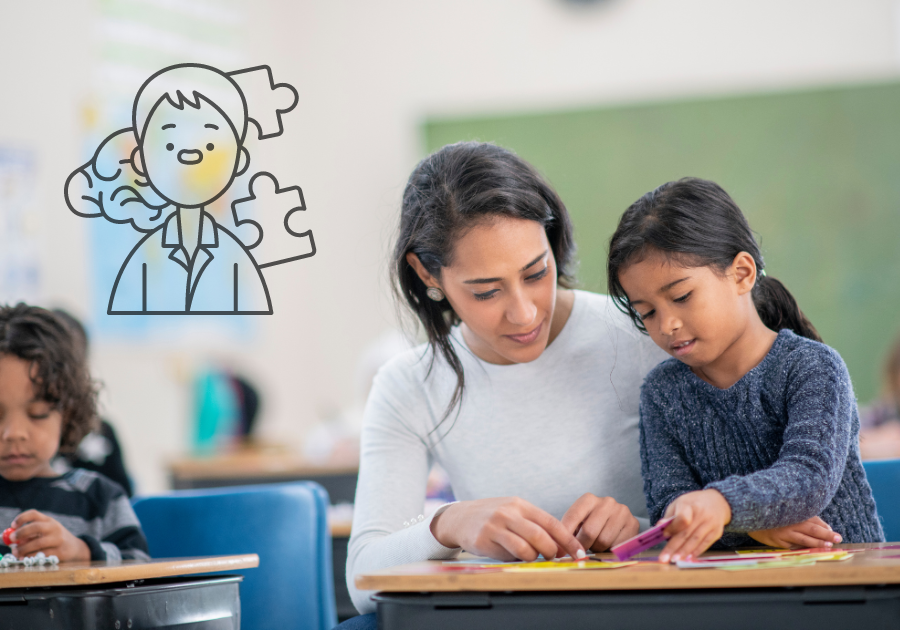Why Paraprofessionals are Necessary in Schools
Why Paraprofessionals are Necessary in Schools
.jpg)
Paraprofessionals play a crucial role in supporting educators and students in schools. Their main responsibilities are to reinforce educational lessons, provide one-on-one or small group learning and behavioral support to students who may require additional assistance, and work with children with special educational needs to help bolster their success.
They work closely with teachers to ensure that students can fully grasp and understand the material being taught. In this post, we will explain why paraprofessionals are necessary in schools by explaining their roles and how each role is essential to ensuring a balanced and informed classroom. Keep reading to learn more!

What Do Paraprofessionals Do in Schools?
Paraprofessionals take on many roles in the classroom. Most often they are there to assist specific students with special needs or a learning disorder. However, each school district handles how they manage paraprofessionals differently.
Below we will look at a few different roles paraprofessionals take, and why each role is essential.
Paraprofessionals Support Instruction
Paraprofessionals play a vital role in supporting instruction in the classroom. They work alongside teachers to reinforce educational lessons and ensure that all students can fully grasp the material being taught. Paraprofessionals may lead small group discussions, provide one-on-one assistance to students, or help with hands-on activities to enhance learning.
Their support is especially crucial for students who may require additional attention or have special educational needs. By working closely with paraprofessionals, teachers can differentiate instruction and provide personalized support to students, ultimately helping them succeed academically.
Paraprofessionals Support Special Education
Supporting special education involves working closely with students who have special educational needs or disabilities. It requires implementing individualized education plans (IEPs) as directed by special education teachers. The goal is to ensure that these students receive the necessary support and accommodations to succeed academically and socially.
Paraprofessionals also assist in creating a positive and inclusive learning environment for all students. They help to foster a sense of community within the classroom, encouraging collaboration and support among peers. By building strong relationships with students, paraprofessionals can provide emotional support and encouragement, helping students feel valued and motivated to learn.
In addition to providing academic support, paraprofessionals also play a key role in behavior management and crisis intervention for students with special needs. They are trained to recognize and respond to behavioral issues calmly and effectively, helping to de-escalate situations and ensure the safety of all students. This skill can help prevent major issues before they begin.
Paraprofessionals Provide Behavioral Support
Behavioral support refers to a range of strategies and interventions designed to help individuals manage their behavior and promote positive change. As an assistant responsible for implementing behavioral interventions and support plans, paraprofessionals play a vital role in helping individuals develop the necessary skills to achieve their behavioral goals.
One key task for paraprofessionals involves assisting in implementing behavioral interventions. This requires close collaboration with behavioral specialists, teachers, and other professionals to design and implement individualized plans for students. These plans may involve strategies like visual cues, rewards and consequences, and social skills training. Paraprofessionals also ensure the consistent implementation of these interventions and provide necessary support to students in adhering to the plans.
Additionally, they are tasked with monitoring and supporting students' social and emotional development. This involves observing students' behavior, documenting progress, and providing guidance and support when needed. They can contribute to their social and emotional development by promoting positive peer interactions, facilitating conflict resolution, teaching self-regulation techniques, and providing opportunities for emotional expression.
Paraprofessional Support from Child Focus
Child Focus strongly believes in the benefit of paraprofessionals in schools. Paraprofessionals have been proven to be effective at improving the educational standards in classrooms in which they work, while also offering individualized support to students with special needs.
The Genesis School Program, a school designed to provide excellent education to children with special needs and operated by Clermont Educational Service Center, receives behavioral health support services from Child Focus including Therapy and CPST.
The Genesis School program is designed to allow students to receive direct instruction in, then practice, the skills needed to participate successfully in their home district programs. Each classroom is facilitated by at least one teacher and one paraprofessional. The Genesis School provides excellent education for children with special education needs and Child Focus is proud to be a key supporter.
To learn more about other options Child Focus offers for children with special education needs, click here!
For more tips on mental health, building a healthy family relationship, and more, follow Child Focus on Facebook, X, Instagram, and LinkedIn today!
Has Child Focus made a difference in your life or the life of someone you care about? Leave Us A Quick Review Here!
